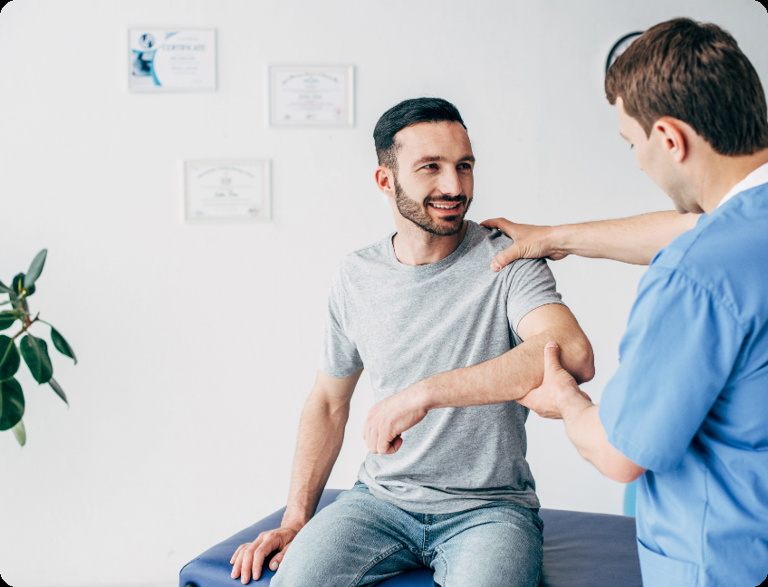Diagnosis and Treatment of Chronic Shoulder Instability in Wake County

What is Chronic Shoulder Instability?
Your shoulder is a body part that facilitates movement. Chronic shoulder instability occurs after sustaining an acute injury to the shoulder, like a fall or accident. Once a dislocation occurs, the shoulder is more likely to slip in and out of place. This consistent slippage is called chronic shoulder instability.

What Causes Chronic Shoulder Instability?
Generally, chronic shoulder instability occurs following a severe injury or accident where the shoulder is dislocated or otherwise severely damaged. After dislocation, the ligaments, muscles, and tendons that surround the shoulder become loose or torn. When this occurs, shoulder dislocation can begin to happen more frequently, which is then classified as chronic shoulder instability.
Chronic Shoulder Instability Risk Factors
Risk factors for chronic shoulder instability include:
- Young age
- Involvement in high-demand contact sports
- History of ipsilateral traumatic dislocation
- The previous dislocation also contributes to chronic shoulder instability post-injury.
- Deltoid muscle or ipsilateral rotator cuff insufficiency
- A Hill-Sachs or osseous Bankart lesion
- Underlying laxity of ligaments
Symptoms of Chronic Shoulder Instability
You will most likely know if you are experiencing chronic shoulder instability because the symptoms will present themselves every time you attempt to engage in a high-contact activity. The following are common symptoms indicating chronic shoulder instability:
- Repeated shoulder dislocations with or without strenuous activity
- Repeated instances of the shoulder giving out with activity
- Persistent sensation of the shoulder slipping out of place, feeling loose, or feeling like it is hanging down. This sensation can come with or without pain and can occur with or without strenuous activity.
- Pain caused by a shoulder injury
How is Chronic Shoulder Instability Diagnosed?
Your doctor may diagnose you with chronic shoulder instability after conversing with you about your symptoms and medical history, and then conducting a medical exam. The exam often includes mobility tests and testing for general looseness in your ligaments. You might also undergo X-ray imaging or MRIs to help your doctor accurately diagnose your issue.

Treatment for Chronic Shoulder Instability in Wake County
Physical therapy exercises are a great first line of defense that your doctor may suggest if your chronic shoulder instability is unrelated to an immediate injury. If it is related to an immediate injury, they may check for damage to the surrounding tissues, bones, and ligaments before deciding on a line of treatment.
Non-surgical treatment for this condition includes:
- Physical therapy exercises to strengthen the rotator cuff muscles.
- Resting the shoulder and restricting movements to help the tendons recover.
- Using anti-inflammatory medication to help reduce pain and swelling.
If non-surgical treatments do not bring about improvement, your doctor may recommend surgery. Arthroscopic surgery is the most common procedure to correct chronic shoulder instability. A small camera and tiny instruments are inserted through minor cuts, which allows for effective yet minimally invasive surgery. Surgery to correct shoulder dislocation involves tightening and repairing torn or damaged ligaments to promote strength. For shoulder instability, the surgery includes repairing a torn labrum and the surrounding ligaments to increase stability.
You will be temporarily immobilized after surgery in a sling for 2-6 weeks post-op depending on the complexity of the surgery. After your time in a sling, you will likely undergo physical therapy to regain your range of motion and strength.

Chronic Shoulder Instability Recovery Time
If you undergo surgery, the recovery period will last for a few months. If you do not opt for surgery, you can expect improvements after several months of physical therapy. Speak with your doctor or physical therapist on a timeline regarding return to regular activity, since this timeline varies from person to person.
How Can I Prevent Chronic Shoulder Instability?
The best way to prevent chronic shoulder instability is to keep your shoulder strong by performing strengthening exercises. Try to avoid overdoing any activity if you suspect an issue. Some risk factors like age or body makeup are impossible to overcome, but safely conducting yourself while exercising can prevent this condition.

Expert Shoulder Care at Raleigh Orthopaedic
If you suspect chronic shoulder instability, get in touch with the experts at Raleigh Orthopaedic for an assessment. Our shoulder specialists are ready and willing to help you get back to your everyday activities pain-free. Contact us today or book an appointment online at any of our clinics in Wake County, NC.







